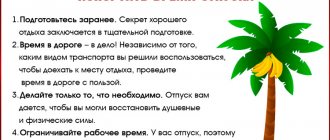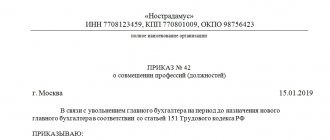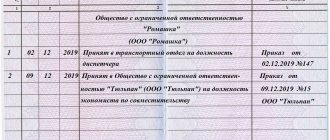Often, the boss, inspired by watching Hollywood films, allows himself the sharp phrase “You’re fired” on every convenient and inconvenient occasion. However, familiarity with the norms of the Labor Code makes it clear that dismissal for violation of labor discipline is not an easy task. So that the manager himself does not have to explain himself in court, the personnel service will have to remind the relevant provisions of the Labor Code of the Russian Federation.
What is work discipline?
Important! Please keep in mind that:
- Each case is unique and individual.
- A thorough study of the issue does not always guarantee a positive outcome. It depends on many factors.
To get the most detailed advice on your issue, you just need to choose any of the options offered:
- Use the online chat in the lower corner of the screen.
- Call: Federal number: +7 (800) 511-86-74
When an employer talks about dismissal for systematic violation of labor discipline, he means the employee’s failure to comply with the requirements of Article 189 of the Labor Code of the Russian Federation. It stipulates that the responsibilities of the parties to the employment agreement include strict compliance by hired persons with the internal regulations of the enterprise, as well as the creation by the employer of the most favorable conditions for this.
The rules of conduct for employees within the enterprise during working hours cover a fairly wide range of issues:
- operating mode;
- hiring and firing procedures;
- localization of jobs (in the meaning of Article 209 of the Labor Code of the Russian Federation);
- the main duties and responsibilities of the parties;
- conditions for bonuses and penalties;
- other significant aspects of labor relations.
A wide range of issues related to the concept of labor discipline allows almost any employee’s misconduct to be subject to disciplinary punishment.
Types of labor discipline violations and grounds for dismissal
There is no exact list of situations that clearly qualify as a violation of work discipline in the Labor Code. When determining the reason for an unplanned settlement, it is customary to conditionally divide all offenses into one-time gross and systematic ones, occurring constantly or at least twice.
Immediate termination of the employment contract will provoke: absenteeism or long-term (more than 4 hours in total per day) absence from the workplace, being at work under the influence of alcohol or drugs, theft or causing harm to the enterprise, as well as deliberate failure to comply with labor protection requirements. A correctly documented fact, even a single, similar action by an employee will entail the appearance in his labor report of clause 6 of Article 81 of the Labor Code of the Russian Federation.
A little longer, the employer will tolerate deliberate disregard of official duties. In order to get rid of an irresponsible employee, management must record at least two cases of laziness on the part of the hired person within 365 days. In this case, you can apply clause 5 of Article 81 of the Labor Code to the employee and dismiss him for systematic violation of labor discipline.
Truancy or birthday?
The Judicial Collegium for Civil Cases of the Supreme Court of the Russian Federation, in Determination No. 16-KG20-5 of July 13, 2020, considered the case of dismissal under subparagraph “a” of paragraph 6 of part 1 of Article 81 of the Labor Code of the Russian Federation for a single gross violation of labor duties by an employee - absenteeism. Let's look at it in detail.
The essence of the dispute
The organization conducted an internal investigation on 08/03/2018 into the fact that the head of the HR department had committed a disciplinary offense, which resulted in the employee’s absence from the workplace on June 4, 9, 13, 21, 27, 30, 2021. This was the basis for dismissal.
The employee believes that her dismissal on the above grounds is illegal, since she did not commit any violations of labor discipline, since her absence from the workplace:
- On June 4, more than four hours in a row were agreed upon with the immediate supervisor due to the established practice in the organization of the employee ending the working day early on his birthday;
- On June 9, the working day for all employees of the organization was set until 15:00;
- On June 13 and 21, she visited pharmacies to introduce newly appointed managers to the teams;
- On June 27 and 30, she took part in the accreditation commission during the initial accreditation of specialists.
Therefore, she filed a lawsuit to invalidate the act of conducting an official investigation, to invalidate the order to terminate the employment contract, to reinstate her at work, and to compensate for moral damages.
The RF Armed Forces supported the employee. As the judges note, the appellate court did not explore the possibility of applying another, less severe type of disciplinary sanction based on such principles of legal responsibility as fairness, proportionality, and humanism.
In the commented case, dismissal for absenteeism is unlawful, made with incorrect application of substantive law and in violation of procedural law.
As a result, the Supreme Court sent the case for a new trial. It is noted that the employer is obliged to provide evidence indicating that the employee committed one of the gross violations of labor duties (paragraph 38 of the resolution of the Plenum of the Supreme Court of the Russian Federation dated March 17, 2004 No. 2 “On the application by the courts of the Russian Federation of the Labor Code of the Russian Federation”).
Gross violation of labor discipline
Paragraph 6 of Article 81 of the Labor Code lists offenses that are recognized as gross violations of labor discipline. Here they are:
- absenteeism;
- showing up at work in a state of alcoholic (drug, toxic) intoxication;
- disclosure of commercial, state, official, etc. secrets protected by law;
- committing theft (including small) of someone else's property at the place of work, its intentional destruction, embezzlement;
- violation of labor protection requirements, if this led to serious consequences (accident, breakdown, catastrophe) or created a real threat of such consequences.
If an employee has committed one of the listed offenses, he can be fired. But first it is necessary to conduct an internal investigation to establish the circumstances of the violation. It may turn out that the employee committed an offense forcedly, for good reasons.
Absenteeism
Absenteeism is the absence of an employee from the workplace without good reason for more than four hours in a row or the entire working day (shift). Truancy can also be considered:
- unauthorized leave;
- unauthorized use of vacation;
- unauthorized termination of work at an enterprise where a person was assigned after graduating from an educational institution and had to work for a certain period of time;
- absenteeism from work before the end of the 14-day period, if the employee wrote a letter of resignation of his own free will.
Please note: in order to fire an employee for absenteeism, you must document that the employee was actually absent from the workplace for the required amount of time.
When absence from work is not considered absenteeism
This is when there is a good reason. Excused absence is a case where the employee was absent from the workplace for more than four consecutive hours, minus the time officially allocated for rest (for example, a lunch break), which cannot be qualified as absenteeism.
In this case, the employee provides documentary evidence of his circumstances.
The employer decides for himself what is considered a valid reason for absence from work and what is not. Therefore, labor disputes are not excluded. It is better to discuss all controversial issues with the employee in advance.
Responsibility for violations
Parting with an employee under the article for repeated violation of labor duties is, rather, a way of influencing employees. More often, to restore order in the team, the employer resorts to more loyal types of punishment. Article 192 of the Labor Code of the Russian Federation, in addition to dismissal for non-compliance with labor discipline, as the strictest penalty, provides two more types of punishment:
- remark (for non-serious cases, which, nevertheless, cannot be ignored);
- reprimand (for more serious offenses that entailed negative consequences, or required a lot of effort and money to correct them).
The employer has the right to apply any of them if the employee’s guilt is proven and the method of influence is proportionate to the gravity of the crime, Art. 192 TK. Moreover, management is free to choose a less severe punishment for the employee, or may refuse it altogether, Art. 193 TK. The director’s competence also includes the early removal of a previously imposed penalty, Art. 194 Labor Code of the Russian Federation.
Dismissal procedure
Any violation must be considered on its merits, taking into account all mitigating and exculpatory circumstances. Article 192 of the Labor Code of the Russian Federation calls the employer to do this. If the employee’s guilt is undeniable and management is not inclined to stand on ceremony with the offender, personnel officers will have to go through the difficult formal path of preparing documents for dismissal for failure to comply with labor discipline. And in order not to replenish the archive of judicial practice in favor of the employee, you must not skip a single step.
Certification of the fact of violation
Recording an offense is the starting point for applying any disciplinary sanction. The employer’s confidence that the employee will not be able to challenge the legality of dismissal for violation of labor discipline depends on how completely and objectively the procedure is carried out:
| Type of violation | Fixation method | Employee's counterarguments |
| Absenteeism or absence from work for more than 4 hours | An absence from work certificate signed by at least two witnesses. It must be taken into account that the people who signed must have the opportunity to personally verify the person’s failure to appear or constant absence from the workplace. | The most common shield for an employee is a certificate of sudden illness or sick leave. In the first case, the absence will not be paid, but dismissal can be avoided. Any document confirming the unforeseenness and urgency of personal circumstances will also help justify the case. |
| Late | The same act, but for dismissal there must be several of them. You need to understand that management will not be able to kick an employee out for systematic tardiness without additional evidence. | The reasons for being late can be very different, but the employee must provide a convincing explanation for each of them. A broken lock, a malfunctioning elevator, an illness in a pet, or a burst pipe can evoke sympathy from your boss. At the same time, regular late appearance at work for any reason is a direct way out. |
| Refusal to comply with labor safety rules | A memo from the responsible employee or an accident report at the enterprise | The employee must report the impossibility of work and a threat to health to the supervisor before starting work. If this was the result of management shortcomings, then the dismissal of the employee is considered illegal, Art. 220 Labor Code of the Russian Federation. |
| Theft or damage to property | A written statement to the police, independent recording of the fact of damage with the involvement of witnesses and further internal investigation | An employee will be able to protect himself not only from dismissal, but also from the obligation to reimburse material costs, if he proves that the valuables were not transferred to him for safekeeping legally. The absence of a financial liability agreement signed by the employee will also help. |
| Appearing in a state of any kind of intoxication | A report from the immediate superior and a medical examination or a written refusal to visit the hospital. | Stubborn refusal to draw up or sign any documents will work against the employee. The management will simply draw up a notice of refusal and lawfully dismiss the employee. If the cloudy state is not related to the use of strong drinks, it is necessary to prove that the inadequacy of the reaction arose as a result of a sharp deterioration in health. |
Real life situations can go far beyond the standard options. The main thing when preparing documents is objectivity, as well as the involvement of disinterested witnesses and experts.
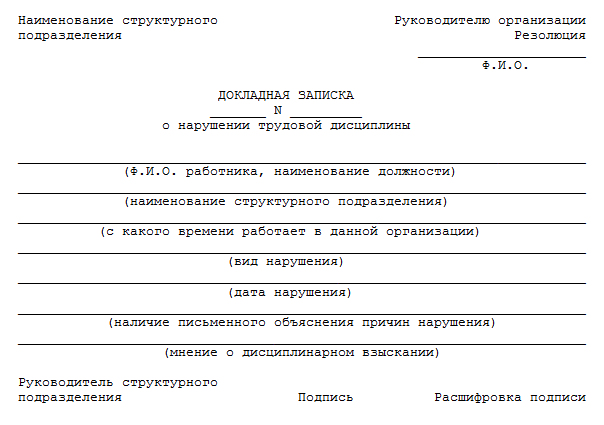
Issuing a warning to an employee
Even if the situation is interpreted unambiguously and, in the employer’s opinion, the employee deserves the most severe punishment, it will not be possible to apply it without an explanation from the employee. The law obliges the employer to request them from the offender in writing, Art. 193 Labor Code of the Russian Federation.
There is a generally accepted form asking the employee to prove his innocence, but you can make your own changes to it if this applies to what happened. If the employee refuses to receive the request, then it must be read out loud and the refusal must be confirmed by the signatures of witnesses. Or formalize this fact in a separate act.
Preparation and receipt of an explanatory note
The employee is given two working days to substantiate the unintentionality of his actions or prove the occurrence of insurmountable circumstances. During this time, he can obtain the necessary certificates, seek advice from a lawyer, or simply state the reasons for his behavior.
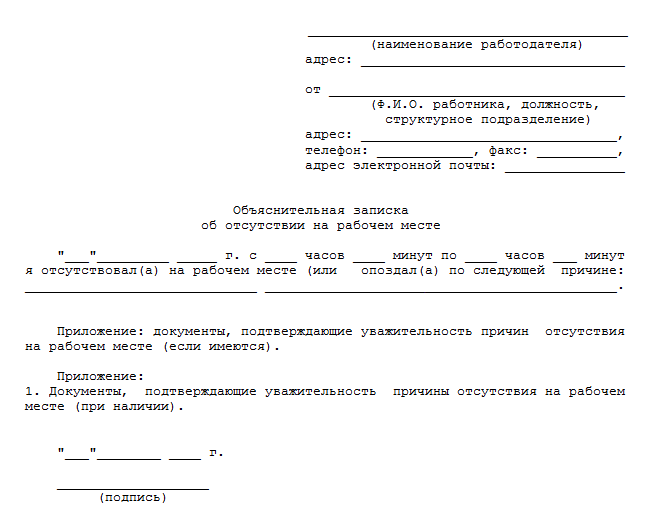
Often the employer demands urgent writing of an explanatory note or threatens immediate dismissal. In this case, the employee should not rush or be afraid: the management is not able to influence the deadlines. But in order for management not to succumb to the temptation of quick reprisal, the employee must receive a copy of the demand against his signature, and when handing over the explanatory note to the director, make him sign on the second copy.
Consideration and assessment of the fact of violation
Since dismissal for failure to comply with labor discipline is an extreme measure, decision-making often occurs collectively. It would be better if the boss’s conclusions were confirmed by members of a specially created commission. If an employee is a member of a trade union, then taking their opinion into account is also indispensable.
Individual adoption of radical measures threatens the employer with inspections by labor inspectors, the prosecutor's office, and, in the worst case, a court decision not in his favor.
Order of dismissal for violation of labor discipline
The final act, in an unfavorably developing situation, will be an order of dismissal. You can take the unified T8 form as a sample. The only difference from the standard order to terminate an employment contract will be the basis for the calculation - the mention of one of the paragraphs of Article 81 of the Labor Code of the Russian Federation.
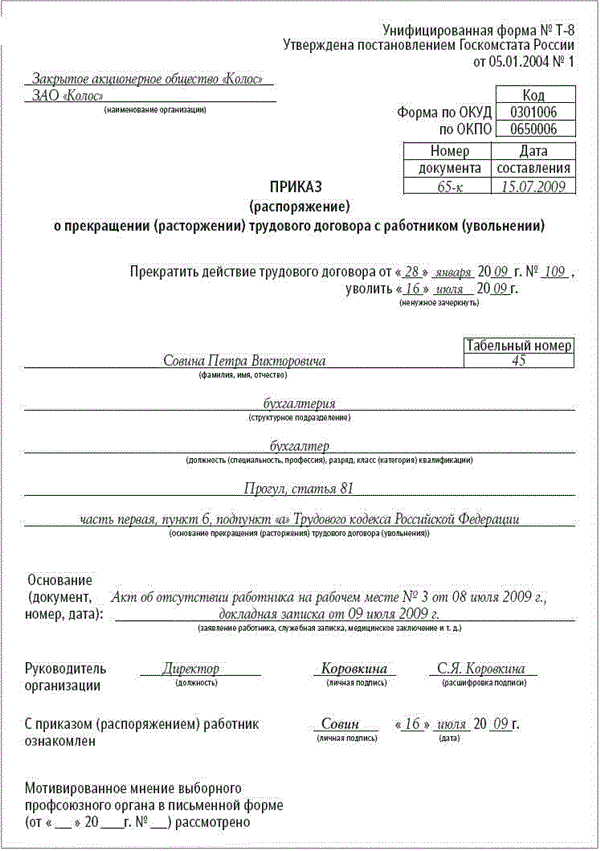
The procedure for dismissal due to failure to fulfill job duties
The dismissal must be carried out in accordance with the prescribed procedure. If the employer ignores this procedure, the employee can also challenge the dismissal. Let's consider the main stages of the procedure:
- Recording the grounds for dismissal. Involves control over labor discipline with subsequent recording of violations in writing. This stage is regulated by Article 81 of the Labor Code of the Russian Federation.
- Confirmation of the legality of dismissal. An explanation must be obtained from the employee regarding the fact of failure to fulfill duties. At this stage, an existing disciplinary sanction is identified that has not expired. The possibility of dismissal is checked (a number of employees cannot be fired).
- Documentation of termination of an employment contract. The manager issues a dismissal order. A note-calculation is also published. The employee is sent notice of dismissal. A corresponding entry is made in the work book.
- Carrying out calculations. The employer must pay the employee wages for the period worked and compensation for unused vacation.
- Delivery of documents. On the day of dismissal, the employee must receive a work book and other documents. This necessity is established by Article 84.1 of the Labor Code of the Russian Federation.
If the employer does not give the employee wages and documents, the latter may go to court to restore his rights.
Drawing up an explanatory note
Before dismissal, the employer must receive an explanatory note from the employee. It indicates the reasons why the failure to fulfill labor duties occurred. In the future, the employer, based on the explanatory note, is obliged to:
- study the explanations provided;
- assess the severity of the employee’s guilt;
- study the situation preceding the violation.
ATTENTION! The employee is given 2 days to draw up an explanatory note.
The manager must also take into account the employee's previous behavior. The employee may refuse to draw up an explanatory note. This does not relieve the employee of responsibility. In this case, the employer must draw up a report. It states:
- The fact of contacting an employee to receive an explanatory note.
- Fact of refusal to draw up a document.
The document must have the signatures of a number of key employees: deputy director, secretary, lawyer.
Making an entry in the work book
First you need to enter the date of dismissal. Then the following form is written:
“Dismissed due to repeated failure to fulfill job duties without valid reasons on the basis of paragraph 5 of Article 81 of the Labor Code of the Russian Federation.”
In the last column you need to refer to the date and order number.
Time limits for dismissal
The mere fact of a gross violation of discipline does not predispose the authorities to show patience with the offender. Therefore, dismissal as a disciplinary measure is not long in coming. But if the situation requires consideration or investigation, then the employer must remember that the law gives him only thirty days from the moment the offense was discovered, Art. 193 Labor Code of the Russian Federation. This means that management will not be able to threaten dismissal and keep the employee in constant tension. The law insists: either a proportionate punishment within a month, or complete forgiveness of the offense.
Those employees who plan to hide from the wrath of management on vacation or on sick leave should know that these periods are excluded from the period allotted for making a decision on the fate of the negligent employee, Art. 193 Labor Code of the Russian Federation. That is why, after a sudden exacerbation of chronic illnesses, no matter how long it lasts, the hired person will have to give written explanations about the reasons for his behavior.
There is one more restriction: you cannot punish for a violation that is discovered six months after it was committed. This period is extended only for those events that can only be discovered through an audit or through the involvement of auditors. Then the collection may occur two years later.
Is it possible to challenge a disciplinary sanction in the form of dismissal?
The Labor Code allows the employer to dismiss for violation of discipline under paragraphs 5-11 of Article 81 (“Termination of an employment contract at the initiative of the manager”). Each section of this document is devoted to specific issues.
| Article of the Labor Code | Decoding |
| Paragraph five prohibits repeated violation of labor duties | Two disciplinary sanctions for misconduct or more (reprimands, reprimands). |
| Point six describes a one-time but gross violation | Gross violation of labor order. It means absenteeism, appearing at work while drunk, an act of corruption, disclosure of state secrets, official or commercial information. |
| Point seven concerns unjust enrichment, conflict of interest | Violation by a financially responsible person of the legal order for the distribution of material and financial benefits. Such actions lead to a loss of trust on the part of the employer. For employees of municipal and state authorities - incomplete or unreliable provision of information on income and expenses, concealment of accounts and property. |
| Paragraph eight, valid for educators and teachers | Immoral behavior in children's (educational) and school (educational) institutions. |
| Point nine, designed for financiers | For the theft of financial assets from an enterprise's account, the actions of accountants in this case cause damage to the enterprise. |
| Point ten, only for managers. | One-time gross violation of labor duties by the boss or his deputy. |
| Point eleven, for specialists who have recently been hired by the enterprise. | For forgery when applying for a job, when presenting “purchased” diplomas, when providing false information. |
Read,
what does a citizenship certificate look like?
.
Where to complain about illegal redevelopment of an apartment? Who is responsible for this? The answer is here.
Rough
Since the legality of a unilateral refusal of a contract with an employee must be confirmed by the employer, it is he who needs to collect evidence of the fairness of the decision and document the situation. The standard set usually includes:
- A memo from one of the staff members or the violator’s immediate superior;
- An act of establishing the fact of a misdemeanor (suitable for truancy, drunkenness, refusal to follow orders, violation of safety standards, etc.);
- Comparison statements compiled on the basis of inventory (if shortages, thefts, waste of valuables or funds are detected);
- Additional materials (surveillance camera footage, witness statements, certificates from medical institutions, conclusions of the audit commission or independent auditor).
We invite you to familiarize yourself with: Dismissal from the army due to general education
The act simply records the circumstances of what happened, without giving it any legal or emotional assessment, without drawing a conclusion about the type of punishment. You can only point out the need to request an explanation from the employee (the waiting period for a response is at least 2 days, Article 193 of the Labor Code).
The employer’s step-by-step algorithm of actions does not greatly depend on the form of violation of discipline and labor duties. It is mandatory to:
- Identify the fact of misconduct and document all the circumstances (in the form of an act, a collation sheet, an inventory or an accounting record). If necessary, issue a referral for drug testing.
- Request an explanation from the employee. They do this in person if the employee is at work, or send it by mail if the person does not show up for work.
- Wait 2 business days, not counting the day the request was announced. If it was sent by letter, then the countdown of the waiting period begins from the day the item is actually delivered to the addressee.
- Individually or with the involvement of a working commission, make a decision on the validity of the circumstances set out by the employee in the explanatory note. Assess the degree of their influence on the situation and the specialist’s guilt, as well as his motives.
- Based on these findings, issue an order to impose the selected type of penalty; the available options are listed in Art. 192 TK. Under signature, familiarize the employee with it or attest to his refusal.
- If earlier, within 365 days before the case in question, the employee had already received penalties, then it is permissible to immediately issue a dismissal order.
- Give your former colleague a work book and pay slips, a copy of the order and a certificate of income.
Own forms of personnel documentation can be approved for each organization, Art. 8 TK. However, most enterprises use unified forms recommended by the State Statistics Committee in Resolution No. 1 of 2003. To formalize disciplinary punishment in the form of dismissal, use the T-8 form.
Such an order must contain:
- details of the enterprise and personal data of the employee;
- reason for the settlement (“disciplinary dismissal based on ...”)
- link to subparagraph of Art. 81 TK;
- list of supporting documents (acts, certificates, explanatory notes, court decisions, etc.);
- signatures of management and employee.
Regardless of the date of commission of the offense, the date of termination of cooperation with a specialist cannot occur before receiving the relevant conclusions, explanations or a court verdict. Before the end of the proceedings, the employee cannot be dismissed, and only in some cases is removal from his position without preserving his earnings allowed, Art. 76 TK. As an alternative, you can offer the employee a temporary transfer to another location.

The employer is obliged to return the individual book about the experience accumulated over a lifetime to the owner of the document no later than the day following the dismissal; the procedure is described in Art. 84.1 TK. If an employee had to be fired for absenteeism without his presence, then you need to send him a letter within the same time frame with an offer to pick up the work record or keep it for 50 years, as a document of “eternal” storage, Art. 22.1. Law 125-FZ.
The labor report itself will state the reason for the dismissal, the date of the event and a reference to the Labor Code of the Russian Federation (subparagraph of Article 81 of the Labor Code will depend on the type of misconduct).
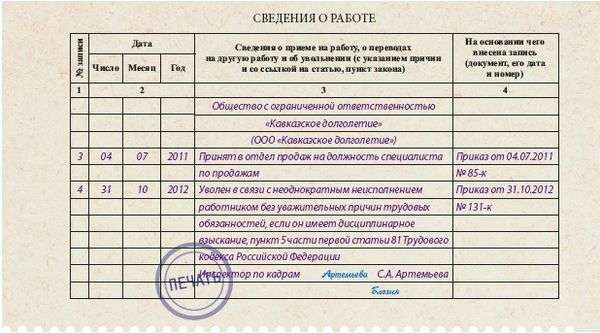
Sample note of dismissal for systematic failure to perform a job function
A flagrant misconduct by an employee or systematic violations of discipline cannot become the basis for long-term blackmail on the part of the employer. If management believes that the only correct decision in the current situation is dismissal, then you need to exercise your right within:
- 30 days from the date when the incident was reported to the immediate superior, even if he is deprived of the right to impose penalties;
- six months from the date of the violation, if this did not become known immediately;
- 24 months from the date of commission of the offense, to detect which an audit must be carried out.
An order to unilaterally terminate labor cooperation based on the employer’s decision can be challenged at the slightest suspicion of bias or excessive severity. This right is retained by the employee during the first month from the date of delivery of a certified copy of the management order, Art. 392 TK. For timely and correct filing of a claim, it is better to contact a qualified lawyer.
The Labor Code also stipulates that such disputes are resolved directly in court, bypassing the labor commission at the enterprise, Art. 391 TK. However, the law does not prohibit simultaneously contacting the state labor inspectorate and the prosecutor’s office.
If the appeal was successful and the employer’s actions were declared illegal, the company will be forced to:
- reinstate the employee in his previous position and with the same functions (even if another specialist has already been hired for this position);
- pay average earnings for forced absence, Art. 234 TK;
- compensate for material and moral damage (by court decision);
- add a period of absence to the total length of service and change the entry in the labor record;
- transfer to the budget an administrative sanction in the amount of 5,000 rubles (for the first person of the company and individual entrepreneurs) and 30,000-70,000 rubles (for the legal entity itself), possible fines are listed in Art. 5.27 Code of Administrative Offences.

It happens that by the time the judge’s decision is announced, the fixed-term contract is terminated or the employee himself refuses to return to his former employer. Then the court orders to simply change the wording and reason in the dismissal order and pay financial compensation.
How is the calculation made and is it done?
Of course, dismissing an employee for failure to comply with labor discipline is not the most pleasant procedure, first of all, for him. However, this does not mean that a person can be deprived of everything he earned during the time he devoted to the company.
Whatever article is specified in the order to terminate the employment relationship, the employee has the right to:
- current salary;
- compensation for vacation (main, additional, special);
- reimbursement of overexpenditures on accountable amounts;
- bonuses for exceeding the norm, if established;
- payment for overtime hours and time worked on holidays and weekends;
- all bonus payments stipulated under a collective agreement or other local act, unless they are made dependent on the reason for dismissal.
An employer, wishing to punish an employee more severely, cannot refuse to issue timely employment documents, required certificates and copies. He is obliged to provide all other documents that the former employee may require in the future. When dismissing for violation of labor discipline, it is better to confirm your decision with the findings of the commission, the opinion of experts and coordinate this with the trade union, if there is one.
What cases do not relate to violation of labor discipline?
Sometimes employers take disciplinary action against employees inappropriately. First of all, it is illegal to impose a penalty if there is no fault of the employee (the offense was committed unintentionally or was caused by external circumstances). Related to this, in particular, is the requirement to take explanatory notes from employees.
For example, a person was late for work because he was in an accident or provided medical assistance to a close relative. If this fact is confirmed by certificates, then the disciplinary sanction will be illegal, and the labor commission will issue an order to cancel it. But a broken alarm clock is usually not considered a valid reason for being late.
Expert commentary
Gorchakov Vladimir
Lawyer
It is also impossible to punish for improper performance of job duties if this is due to insufficient experience or competence of the employee.
It is prohibited to impose a disciplinary sanction and dismissal under the article if the violation of labor discipline is associated with the employer’s failure to provide the necessary conditions. For example, the nature of the work requires the use of personal protective equipment. An employee who fails to do this may be subject to disciplinary action for violating safety standards. However, if this happened because the employer did not provide the employee with everything necessary, the violator cannot be punished. In this case, responsibility lies with the official whose duties include issuing PPE.
Also, non-compliance with requirements that are not fixed anywhere and are voiced only orally does not apply to violation of labor discipline. For example, an employee came to work wearing clothes that do not comply with the organization’s dress code. However, if local regulations do not stipulate requirements for appearance, then there will be no violation of labor discipline.
Disciplinary sanctions are not imposed for refusal to perform work that is not part of the job duties or requirements that are contrary to the law. For example, taking a person to work on a day off or leaving him to work overtime is possible only with his written consent, with the exception of certain cases (prevention or liquidation of an accident, prevention of an accident, in case of emergency).
Refusal to work after hours (even if other company employees have agreed to this) cannot be grounds for disciplinary action.
What entry is included in the labor record?
The wording containing the dismissal order is transferred to the work book. Therefore, if there is a mention of absenteeism or alcohol intoxication, the employee is guaranteed to read the same on the pages of his work report. A brief explanation of the reasons for ending the relationship with a specialist will not be enough. The law determines that the employer must specify the clause and article of the Labor Code of the Russian Federation.
In case of dismissal for violation of labor discipline, it is necessary to make a record that the calculation was carried out in accordance with Art. 81 TK. But the subparagraph that will be indicated depends on the circumstances:
- paragraph 5 – repeated (systematic) failure to fulfill duties;
- paragraph 6 – one, but gross violation;
- paragraph 10 - in the event that the same actions are performed by the head of the enterprise or his deputies.
Internal labor regulations
7. Responsibility for violation of labor discipline
7.1. For unlawful, culpable failure or improper performance by an employee of his work duties, the employer may apply the following disciplinary measures to the employee: - reprimand; - reprimand; - dismissal. Dismissal as a disciplinary sanction can be applied in the following cases: - systematic failure by an employee, without good reason, to fulfill the duties assigned to him by an employment contract or internal labor regulations, if disciplinary measures have previously been applied to the employee (clause 4 of article 42 of the Labor Code); — absenteeism (including absence from work for more than three hours during a working day) without good reason (clause 5 of Article 42 of the Labor Code); — appearing at work in a state of alcohol, drug or toxic intoxication, as well as drinking alcoholic beverages, using narcotic drugs or toxic substances during working hours or at the place of work (Clause 7 of Article 42 of the Labor Code); — theft of the employer’s property at the place of work, established by a court verdict that has entered into legal force or a resolution of the body whose competence includes the imposition of an administrative penalty (Clause 8 of Article 42 of the Labor Code); — a single gross violation of labor protection rules, resulting in injury or death of other workers (clause 9 of article 42 of the Labor Code); - a single gross violation of labor duties by the head of the organization (separate division) and his deputies, the chief accountant and his deputies (clause 1 of Article 47 of the Labor Code).
7.2. Absenteeism is considered absence from work without a valid reason during the entire working day.
Likewise, workers who are absent from work for more than three hours during a working day without good reason are considered truant, and penalties established for absenteeism may be applied to them.
For absenteeism without a valid reason, the employer has the right to reduce the employee’s duration of leave by the number of days of absenteeism. In this case, the duration of labor leave cannot be less than twenty-four calendar days.
7.3. Before applying a disciplinary sanction, a written explanation must be required from the violator of labor discipline.
An employee’s refusal to provide an explanation cannot serve as an obstacle to the application of a penalty.
The employee’s refusal to give explanations is documented in an act indicating the witnesses present.
7.4. Disciplinary action is applied no later than one month from the date of discovery of the disciplinary offense, not counting the time the employee was ill and/or on vacation.
The penalty cannot be applied later than six months, and based on the results of an audit carried out by competent government bodies or organizations - later than two years from the date of the disciplinary offense.
The specified time limits do not include the time of criminal proceedings.
7.5. For each disciplinary offense, only one disciplinary sanction can be applied.
For employees who have committed a disciplinary offense, regardless of the application of disciplinary measures, the following may be applied: deprivation of bonuses, changing the time of granting labor leave and other measures. The types and procedure for applying these measures are determined by the internal labor regulations, collective agreement, agreement, and other local regulatory legal acts.
7.6. An order (instruction) or a resolution on disciplinary action indicating the reasons are announced to the employee against signature within five days.
An employee who is not familiar with the order (instruction) or resolution on a disciplinary sanction is considered not to have a disciplinary sanction.
The employee’s refusal to familiarize himself with the order (instruction) or resolution is documented in an act indicating the witnesses present.
7.7. For each disciplinary offense, only one disciplinary sanction can be applied.
7.8. If within a year from the date of application of the disciplinary sanction the employee is not subjected to a new disciplinary sanction, he is considered not to have been subjected to disciplinary sanction. In this case, the disciplinary sanction is paid automatically without the issuance of an order (instruction) or resolution.
A disciplinary sanction can be lifted by the employer ahead of schedule before the end of the year on his own initiative, at the request of the immediate manager, trade union or other representative body (representative) of employees, as well as at the request of the employee.
Early lifting of a disciplinary sanction is formalized by an order (instruction) or resolution.
| <<previous| | to the begining | |next>> |

